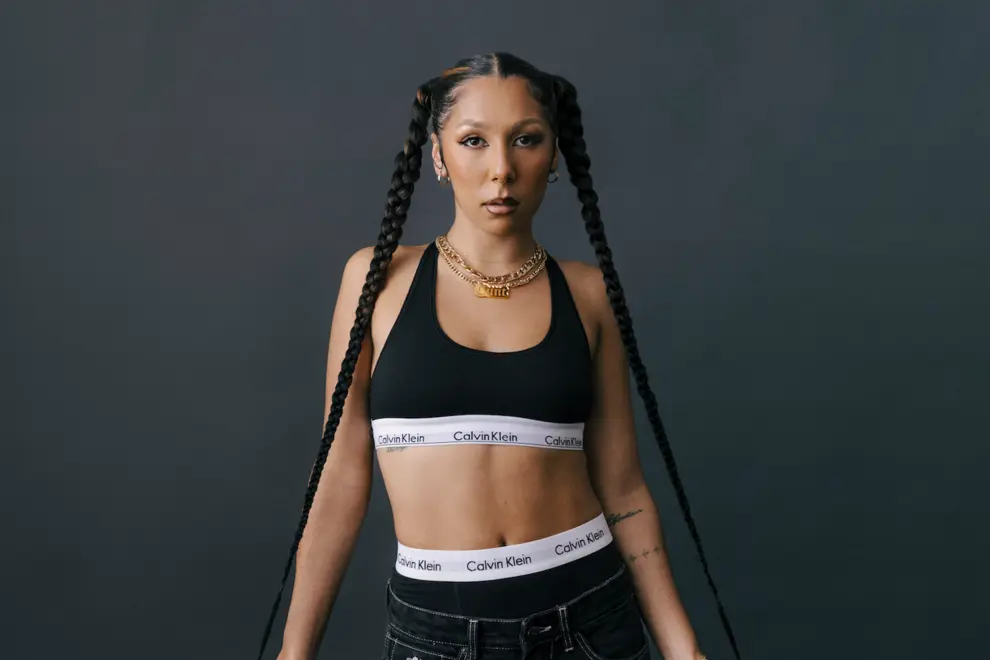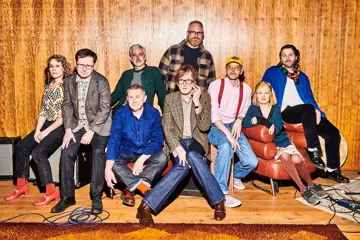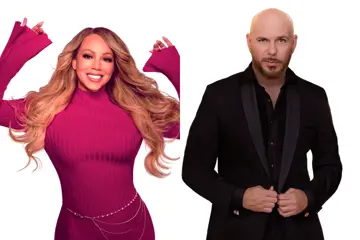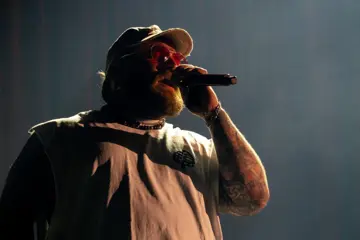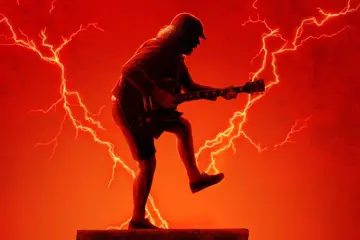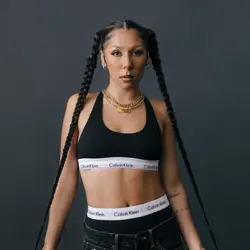 Miss Kaninna
Miss KaninnaMiss Kaninna loves to go surfing. The proud Yorta Yorta, Djadja Wurrung, Kalkadoon and Yirendali woman can escape – and daydream.
“You just hear the birds and the ocean – and you're so vulnerable in the ocean,” she muses. “I think that really puts everything way back into perspective.
“Just being out in nature gives me so much joy. It makes me feel a lot more connected to my people as well. When I'm out in the water, I'll close my eyes and think, 'I wonder if my ancestors swam in this area of the beach?' or 'I wonder if my ancestors have put their foot on the ground that I'm walking on?' or 'I wonder if my ancestors have walked past this tree?' It grounds me back to the earth and back to my culture."
Hailing from Tasmania (lutruwita), the energetic singer, rapper and songwriter has been riding very different waves in 2023 with her Blak pop – establishing a live profile even before airing music. In May she released her debut single, Blak Britney, on Soul Has No Tempo – the Brisbane (Meanjin) stable that launched Jordan Rakei. Miss Kaninna has continued to perform solidly, lately showcasing at the inaugural SXSW Sydney, where she was awarded the Justin Cosby Music Prize for Best Emerging Artist. Over New Year's she'll appear at marquee festivals, culminating in an appearance at Laneway.
Today Miss Kaninna, who grew up on Bruny Island (lunawanna-allonah) off Tasmania's south-eastern coast, is Zooming from her current base of Melbourne (Naarm). She has resided in the Big Smoke for a year – navigating the traffic and "quite intense" public transport system. "I know why I'm here," Miss Kaninna begins. "It's to work hard and to put my head down." Mind, she's made friends, performing at Fitzroy's Evelyn Hotel last February with Remi as a DJ.
Influenced by intersectional theories, Miss Kaninna's art celebrates Blak womanhood. Alas, as "a Blak girl in the colony" who fearlessly protests systemic and internalised racism, she has endured pushback, especially on TikTok – its algorithms exacerbating hate campaigns. "People are becoming very complacent when it comes to racism – and I'm trying to shove that back into people's faces," she asserts. "And clearly it's working 'cause some people are really pissed about what I'm saying!"
Moreover, like many emerging acts, Miss Kaninna is balancing music with day jobs – her work ethic impressive. "I'm still poor as," she laments.
But post-interview, Miss Kaninna will enter the studio for the first time in three months. "I'm really excited to get back in and cook up something nice and fresh." Aside from surfing, her pleasures are family, community and, yes, music. "I feel like when your career is your hobby, you're always joyous."
Miss Kaninna just played Meredith with her full band, declaring it "the best show yet" on Instagram. In the footage, the buzz star wears a keffiyeh, expressing solidarity with Palestinian people – as she did as the guest host of triple j's Hip Hop Show – and sings Bob Marley And The Wailers' unifying One Love.
In fact, that day Miss Kaninna had a migraine, compounded by stress. "I slept on the bus on the way there,” she says. Fortunately, as she hit the stage, the pain dissipated – albeit temporarily. "The actual performance was incredible," Miss Kaninna raves. "I was in shock every single moment of it, because I couldn't believe that many people were paying me attention or were even really enjoying the music... They were very present. I felt really respected and really valued by the audience... We also didn't fuck up anything! Everyone – all the band members – were on point."
Miss Kaninna's story starts on the idyllic Bruny Island, where she and her younger brother were brought up by their mother Ruth Langford – herself a musician who conceived the First Nations social enterprise, Nayri Niara, with its own cultural festival.
Miss Kaninna often discusses family, but matriarchs feature prominently – her grandmother Rosalind Langford is a renowned painter and activist who co-founded the Tasmanian Aboriginal Centre. "My family very much believes, and my community very much believes, that it takes a tribe or a mob or a whole community of people to raise a child." Ruth cared for other children.
Observing First Nations women "thrive" despite endemic anti-Blackness and misogyny was "inspirational". "I guess being around women a lot,” Miss Kaninna says, “and being around heaps of Blak women and just seeing how under-appreciated and undervalued they have been, that really helped shape me into trying to advocate for our rights."
However, Miss Kaninna also developed an independent spirit on Bruny – the island only accessible by ferry. The house was surrounded by bushland but close to a beach with possibly the region's best breaks. "We lived in the furtherest south group of letterboxes."
Crucially, Miss Kaninna wasn't exposed to the Internet, let alone television – though she occasionally watched a borrowed DVD on computer. She received a mobile as a teen when commencing high school, essential for commuting – but was never materialistic. "I was very privileged to grow up so separated from the city – and city life," Miss Kaninna reflects. "At the time, when I was living there, I didn't appreciate it as much. I was very isolated.
"It grounded me in the sense that I know that Mother Nature will always take care of me. I feel like, as I'm growing up and I'm getting older, I'm understanding my childhood a lot more and how important it was to who I'm going to be."
Still, Miss Kaninna was constantly around performers – Mum a professional acrobat prior to pivoting to music, and her Uncles instrumentalists, one playing yidaki. And she revealed an aptitude early. "I've always been really into music, acting, singing and dancing my whole life."
Similarly, Miss Kaninna heard “a wide variety of music”. Her beloved Pop – “the only whitefulla in our family”, she notes affectionately – would blast country. "What I took from country was the ability to just so superficially talk about emotions but, at the same time, so deeply as well," Miss Kaninna ponders. "You have people like Johnny Cash, who was supposed to be this 'masculine' man, talking about how deep the cut and wounds of love are – which I really loved." Now, she laughs, Cash's pining seems like "an every-day white person problem."
Conversely, her mum was drawn to "resistance music", favouring Marley and Ms Lauryn Hill. Miss Kaninna's Uncles banged hardcore rap: 2Pac, The Notorious B.I.G. and 50 Cent.
Miss Kaninna won a place at the prestigious Western Australian Academy Of Performing Arts (WAAPA). But she was "disappointed" by her stint there, feeling unsupported. "I was living away from home when I was 18 – like I'm from Bruny and then, all of a sudden, I moved to Perth, which is a massive jump," she emphasises. "I just kind of fell out of love [with the course] and thought, 'Oh, this is not what I thought it was.'"
Returning home, Miss Kaninna was "persuaded" to pursue a conventional career in nursing – studying in Hobart (nipaluna) during the pandemic. Ironically, that drove the singer to make her music happen. "I was writing essay after essay after essay – and then I thought, 'Do I actually even really want to be a nurse? Am I gonna fulfil that creative side of myself working overtime in a hospital that doesn't care about me; that doesn't actually care about health?'
"And as an Aboriginal woman going through that... I experienced so much racism at university with the marking of my work; with not being supportive environments... So I just thought, 'What is that going to mean to me as an Aboriginal nurse in the hospitals where traditional medicine is probably going to heal these people way more than any of this Western medicine?' It was like a conflict of interest for my own values."
Instinctively, Miss Kaninna penned songs in downtime – landing a gig at 2022's Dark Mofo. For an artist who doubted herself, the response was validating. "I just kept getting booked and booked and booked and booked."
That same year, having graduated as a nurse, Miss Kaninna was invited to audition for a new touring theatre production of The Sapphires – writer/director Tony Briggs contacting her via Facebook. "I just thought, 'That's so random,'" she remembers. "I love The Sapphires – it's obviously about my [Yorta Yorta] mob and my Aunties."
Holding no expectations, Miss Kaninna was surprised to secure the role of Cynthia – portrayed by Miranda Tapsell in 2012's hit film adaptation. But, months on, she became restless. "I was getting all these ideas and I couldn't put them anywhere because I was on tour."
Once The Sapphires wrapped, Miss Kaninna switched focus. "I was like, 'Right, tribe – time to fucking knuckle down and time to put myself first and do what I want' – because I'd been doing what everybody else wants for four or five years," she recalls. "I think that's why I'm so motivated, because I feel like I've suppressed my creativity – but I haven't really been able to show what I can do."
Back in Hobart, Miss Kaninna had bonded with Finn Rees – a member of the tastemaker faves Close Counters now living in Naarm. "He's like royalty down in Tassie – like those boys made it for themselves out of Tassie." She was amped when the "deadly producer" asked if they might collab, agreeing instantly.
Initially the pair worked remotely, but it was cumbersome. Relocating to Melbourne to rehearse The Sapphires, Miss Kaninna finally completed Blak Britney with Rees – the song her first official foray into hip-hop. "I was going to rehearsal at The Sapphires six days a week, from 8:30am to 5:30pm, and then I'd go to the studio from 7:30pm to 1:00am, go to sleep and wake up next day," she says.
Blak Britney is an empowering anthem that cleverly references a '90s icon ("obviously I love Britney Spears"), but was as much prompted by Black Barbie – Miss Kaninna's aim to elevate Blak women in pop culture.
"I wanted people to know my story – like of who my parents are and why I'm the way that I am and where I come from and that, even though, against all odds, the government wants to see me dead and the government wants my actual existence to be wiped off the face of the earth, I'm still fucking here and my people are still here.
"I just wanted [Blak Britney] to encompass how I grew up, who I am, what I wanna be and what I wanna see – the changes that I want to see – and be like, 'Blak women have always been at the bottom but if you give us the chance, we'll outshine all of you."
Blak Britney attracted triple j airplay – Miss Kaninna since scoring "Unearthed Artist Of The Year". Most significantly, it's resonated with Blak women, among her champions BARKAA.
In early 2024 Miss Kaninna will drop an EP, already previewing material live. "I think the EP will be a good introduction to the different genres that I'm exploring," she divulges. "It's not all hip-hop; it's a lot of neo-soul, R&B. It's also a chance for me to sing – like I was a singer first and then a rapper… But I'm really excited for the EP 'cause it will make people understand me as an artist a bit more, rather than just boxing me into hip-hop."
Miss Kaninna doesn't necessarily consider herself a hip-hop act – her second single, Pinnacle Bitch, a club track closer to Green Velvet's acid techno than trap. "I guess, growing up with heaps of genres, that's why I feel like I can't pick a genre that I want to do," she admits. "I want to explore all genres."
Nonetheless, Miss Kaninna is aware that genres such as rap are problematically racialised – the music industry segregating creatives. She specifically mentions how André 3000's ambient New Blue Sun has been automatically classified as "alternative rap" because he's Black. "As musicians, and then definitely as Indigenous and Black musicians, we should be able to make music as artists, rather than genres."
As for Miss Kaninna, she's contemplating a country project. "I still sing a lot of country music – and I love country. It's so funny, my Pop won't listen to me sing unless it's country. He always goes, 'Stop yelling!' or 'Stop swearing!' and 'Why don't you just sing?'"
Meanwhile, Miss Kaninna hopes her decolonisation bangers reverberate – her belief that truthtelling is key to the future liberation of oppressed people globally. "The people that inspire me the most are people who use their platform to speak about what's going on in the world," she states. "People who are true to their music – and who also are true to the people who are listening to the music."
Indeed, Miss Kaninna admires the likes of Ms Lauryn Hill, Kendrick Lamar and Little Simz, “who talk about the struggle and do it in such a beautiful way.”
In March Miss Kaninna will journey to SXSW 2024 in Austin, Texas – US powerbroker Ebro Darden's recent endorsement auspicious. She's previously travelled overseas with Mum – and, at 18, had a European jaunt. But, Miss Kaninna enthuses, "This will be my first time travelling for my art."
First, the ocean is calling – and, with it, the promise of replenishment. Miss Kaninna returned to Tassie for the holidays and in our call, she looked forward to visiting her old house, chilling out and grounding herself on Country, having had no leave in a year. "It makes me really sad that I haven't been able to surf for the past two years now," she says wistfully. “So I don't even know if I'll be any good when I get back home. But I'm gonna try and pick up the board.”

